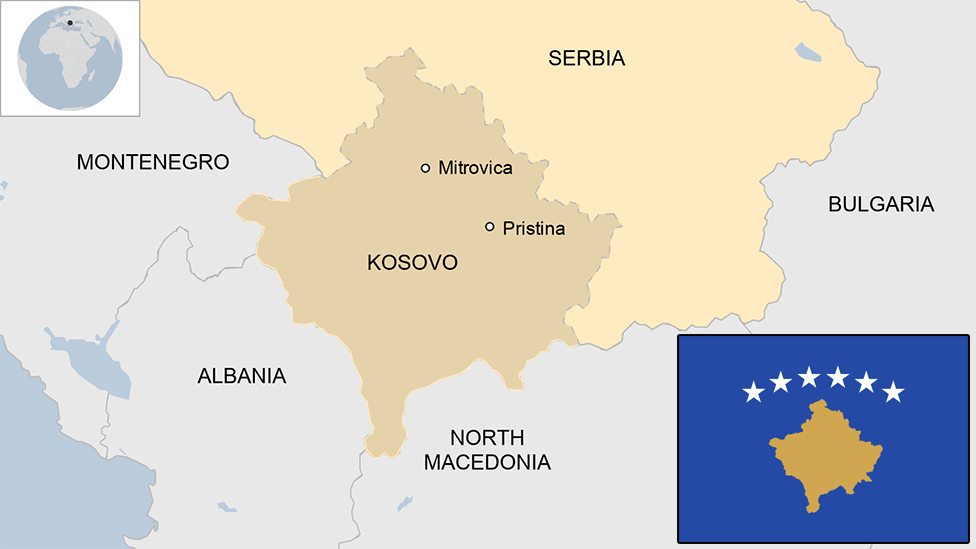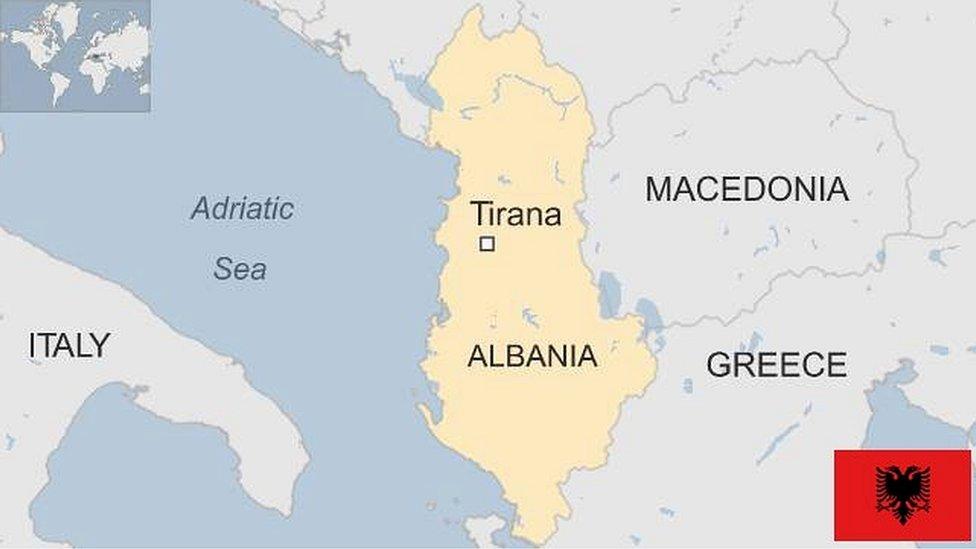Dua Lipa sparks controversy with 'Greater Albania' map tweet
- Published

The British artist has won two Grammy Awards and three Brit Awards
British pop star Dua Lipa has sparked a huge reaction online with a tweet often associated with supporters of extreme Albanian nationalism.
Lipa posted a map that includes Albania, Kosovo and parts of neighbouring Balkan countries and a definition of the word "autochthonous" to suggest Albanians belonged there.
The tweet sparked strong reaction from supporters and critics alike.
Lipa's parents are from Kosovo. She was born after they moved to the UK.
In a follow-up statement, external, Lipa said she rejected ethnic separatism and her post "was never meant to incite any hate".
What's the controversy about?
Lipa was accused of favouring Albanian expansionism after posting the map which forms part of hard-line nationalist dreams of creating a Greater Albania that would incorporate all ethnic Albanians.
It has sparked controversy before. A football game in 2014 between Albania and Serbia descended into open brawls after a drone carrying that map appeared above the stadium.
At the centre of the current dispute is the status of Kosovo which declared independence from Serbia in 2008, nearly a decade after Nato's bombing campaign ended the rule of Serbian strongman Slobodan Milosevic there.
Kosovo is recognised by the US and most European governments, but not by Serbia and its main allies, including Russia.
Allow X content?
This article contains content provided by X. We ask for your permission before anything is loaded, as they may be using cookies and other technologies. You may want to read X’s cookie policy, external and privacy policy, external before accepting. To view this content choose ‘accept and continue’.

The British artist posted the map after a petition appeared online calling for Apple Maps to show Kosovo as an independent nation.
As of Tuesday afternoon the petition has more than 130,000 signatures, external.
Rita Ora - another fellow British pop star who was born in Kosovo's capital Pristina in 1990 - has also tweeted in support of the country appearing on Apple Maps, and in support of Dua Lipa.
Allow X content?
This article contains content provided by X. We ask for your permission before anything is loaded, as they may be using cookies and other technologies. You may want to read X’s cookie policy, external and privacy policy, external before accepting. To view this content choose ‘accept and continue’.

In her original tweet, Lipa included a definition of the word autochthonous - meaning indigenous to a place.
"We all deserve to be proud of our ethnicity and where we are from," she added in a later statement. "I simply want my country to be represented on a map and to be able to speak with pride and joy about my Albanian roots."
Albanian nationalists allege that their people settled in the region long before the Serbs, and use this to claim nearby lands. Serbs say Kosovo is part of its territory - and nationalists often voice their sentiments with "Kosovo is [part of] Serbia" slogans.
Some online users accused Lipa of being a "fascist", and began using the hashtag #CancelDuaLipa.
US-based organisation Team Albanians defended the artist, however, saying she was "debunking the dangerous far-right claims that Albanians are not indigenous people in the Balkans".
Balkans and celebrities
Lipa is the latest celebrity to cause an uproar by wading into Balkan history and politics.
Germany and Bayern Munich's captain Manuel Neuer was filmed singing a popular Croatian football anthem while on holiday in the country earlier this month.
But the song references a region of neighbouring Bosnia-Herzegovina, and there was a backlash in Germany and in the Balkans after the video appeared online.
World number one tennis player Novak Djokovic meanwhile was filmed in January singing what was alleged to be an ultra-nationalist Serbian song. Last week, he received an award by the ethnic Serbian Republika Srpska government in Bosnia-Herzegovina.
Albanians and Serbians remain divided after the War
- Published13 July 2020

- Published28 June 2023

- Published28 June 2023

- Published15 October 2014

- Attribution
- Published15 October 2014
